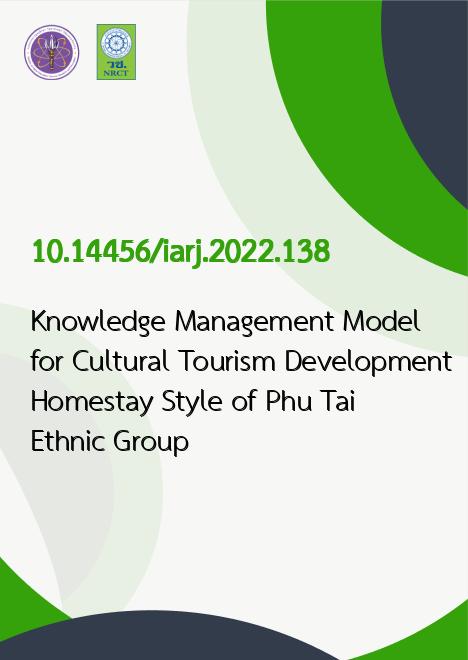
|
Knowledge Management Model for Cultural Tourism Development Homestay Style of Phu Tai Ethnic Group |
|---|---|
| รหัสดีโอไอ | |
| Creator | Boonchuay Mahiwan |
| Title | Knowledge Management Model for Cultural Tourism Development Homestay Style of Phu Tai Ethnic Group |
| Contributor | Wimonmas Pathomvanichkul, Tipaporn Sujaree |
| Publisher | DR.KEN Institute of Academic Development and Promotion |
| Publication Year | 2565 |
| Journal Title | Interdisciplinary Academic and Research Journal |
| Journal Vol. | 2 |
| Journal No. | 6 |
| Page no. | 115-134 |
| Keyword | Knowledge Management Model, Cultural Tourism, Phu Tai Ethnic Group |
| URL Website | https://so03.tci-thaijo.org/index.php/IARJ/about |
| Website title | https://so03.tci-thaijo.org/index.php/IARJ/article/view/263842 |
| ISSN | 2774-0374 |
| Abstract | The tourism promotion policies of the tourism authority of Thailand 2017-2021, are consistent with national guidelines, as can be seen from the promotion of tourism as an essential tool in solving economic problems. create jobs for people and increase income for the country. the homestay is a business that provides accommodation and tours in a way that allows you to experience the local people's way of life and closely experience the nature, environment, culture, traditions, and values of the community. these are essential factors contributing to the provision of ecotourism business services. Thus, this research was to (1) Study the model of knowledge management for the development of homestay cultural tourism of the Phu Tai ethnic group; (2) Study the factors and conditions related to the knowledge management model for the development of cultural tourism. (3) Synthesize a model of knowledge management for the development of homestay cultural tourism of the Phu Tai ethnic group that is suitable for the Thai social context. By using a qualitative research model, the research area is an area of 8 Phu Tai cultural villages in Roi Et Province, Kalasin and Mukdahan provinces which derived by specific selection. The tools used were questionnaires and interview forms. The data were analyzed by descriptive statistics. The results of the research found that (1) knowledge management for tourism development has 4 aspects of knowledge management, namely: 1) the resources for the Phu Tai community, 2) creating activities and learning processes for tourists, 3) managing the network, and 4) income and benefits management; (2) Conditional factors affecting the knowledge management model, namely 1) the context of the Phu Tai community 2) the role of leadership 3) the organization's knowledge management 4) being a learning organization 5) the technology and tools used in knowledge management; 6) the support of government agencies, and 7) the support of external academics. And (3) Knowledge management model for cultural tourism development homestay style of Phu Tai ethnic group appropriate to the Thai social context was found that the Phu Tai community that was able to manage knowledge at a good level had 6 stages: seeking knowledge, knowledge building, knowledge transfer, knowledge storage, using knowledge, and assessment of knowledge management. |